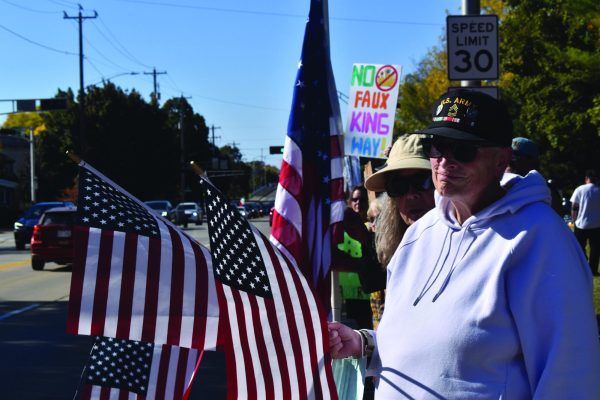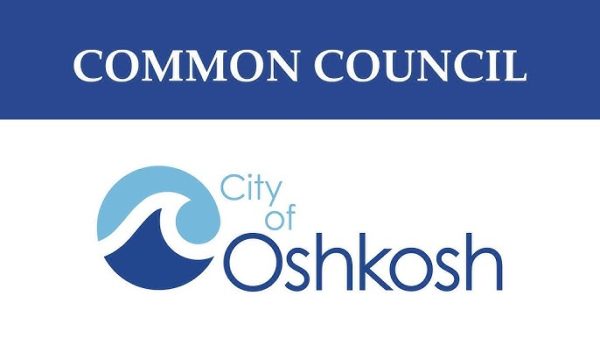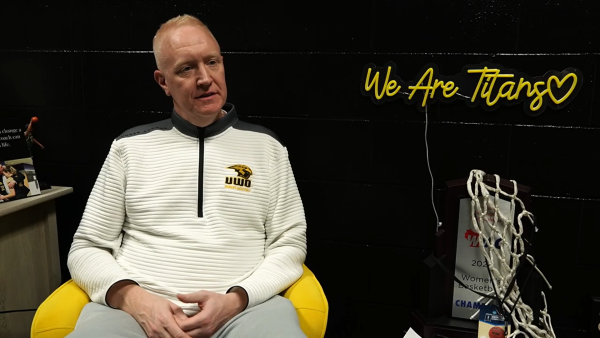UWO professors publish research
UW Oshkosh biochemistry professor James Paulson and organic chemistry professor Linfeng Xie are co-authors of a paper describing new research about chromosomes, which was published in the journal Science on January 18.
Paulson and Xie’s collaborators, Kumiko Samejima and William Earnshaw from the University of Edinburgh in Scotland, used chicken cancer cells to alter an enzyme called Cdk1, or cyclin-dependent protein kinase 1, so that it would be specifically inhibited by a chemical compound that Paulson and Xie had made.
The enzyme triggers cells to undergo mitosis, or cell division. With Paulson and Xie’s compound, it was possible to block a population of the cells just before the start of mitosis and then release the block so that the cells all entered mitosis synchronously.
Other collaborators at the University of Massachusetts and MIT were then able to analyze how the DNA was arranged, minute by minute, and discover how it got compacted into the chromosomes. This gave a more in-depth look at the structure of chromosomes than ever before.
Chromosomes are made of loops of DNA, and these researchers were able to deduce how big the loops are as well as other details. They found that proteins called condensins are responsible for forming the chromosomes. There are two types of condensins, and they were found to do different things.
Paulson did some similar work on the structure of condensins in the 1970s when he was a postdoc. Paulson said people have been fascinated with chromosomes since the late 19th century when they were discovered, and it has taken a long time to figure out the details.
“You might say, ‘What’s the significance in the terms of medicine or something?’” “That’s a tougher question, but I just read something today that said there are some drugs that may target these condensin proteins that may turn out to be useful with cancer treatment,” Paulson said.
Xie said it’s similar to a lot of problems in chemistry or biology and focuses on how things work.
“Mitosis is a very complex system because you have so many phases involved, and there’s this need to understand what happened at each stage,” Xie said. “So by doing this kind of research, similar to a chemist that would develop a drug for use, if we understand how cancer cells grow, we could target it. So we need to understand on a very detailed level how things happen. And so this obviously unified a lot of data published in the past because there were data where people couldn’t quite explain how things happened.”
Paulson said with more information about basic biology, the more potential it is to be useful.
“If you understand the normal biology, you have the potential to understand what goes wrong with it in disease,” Paulson said. “So that’s why we do basic science, because later maybe it will have an important use, even if we can’t foresee it right now.”
Xie said Paulson had done research in the chromosome area for a long time before he approached him.
Paulson said there are at least dozens and maybe hundreds of labs that have worked on this particular problem, including different aspects of it.
“We were working on this compound for another purpose back in 2002 or 2003 or so, so we actually made the compound before Samejima and Earnshaw envisioned this study,” Paulson said.
Paulson said it was great news to find out their compoud tested much better than others.
“By the time they started this [study], [the compound] was commercially available, but it was ridiculously expensive, and what was really exciting for us is that I sent them some of our compound, and they bought some of the commercial stuff, and they tested them, and they found that ours was much better,” Paulson said.
Xie said it’s important to have collaboration among chemists and biologists.
“Dr. Paulson is a biochemist, I myself am an organic chemist, so this kind of collaboration is really great because once we made the compound, then a biochemist or biologist could use it to study something of interest to them, for which an organic chemist doesn’t have the expertise,” Xie said.
Academic department associate David Miles said he is delighted and proud whenever any professor from UW Oshkosh achieves recognition in their field.
“I have always felt that UW Oshkosh deserved a better reputation than it has traditionally enjoyed,” Miles said. “I hope that Chancellor Leavitt and his efforts to spur research on campus continue to garner us well deserved recognition.”










